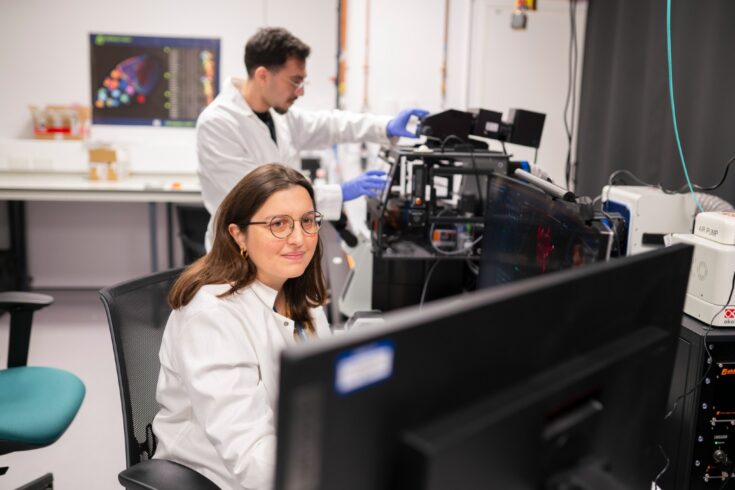It has been a year since I wrote about my first 100 days as director of The Rosalind Franklin Institute. And what a terrific year! I am as energised by the ambition of the Franklin and the enthusiasm of its scientists now as I was then. My confidence that research in the Franklin, and more widely in the UK, can remain world-leading has been hugely buoyed by the government’s commitment to science in the latest budget statement.
At the same time, the sobering economic, social and healthcare challenges that we are reminded of daily makes me mindful of our responsibility to ensure that we deliver outcomes that benefit people in the UK.
Refreshing our science strategy
At the Franklin, we have been refreshing our science strategy to balance technology development and its application with discovery and translational science to preserve a foundation in blue-skies discovery while delivering outcomes of value. Our single strategic focus for this is on creating tools that will transform drug discovery for the twenty-first century.
We are aiming to be as innovative about how we do our science as we are about what we do. Our explicit linkage of technology and life sciences challenges was developed from the ‘bottom up’ by conducting a series of workshops to capture ideas from all of the scientists in the Franklin. We brainstormed how we could join them into groups of related studies to gather critical mass and then prioritised these based on where we had most unique capabilities and the potential impacts of success for each.
The process engaged the whole institute and brought forward a full range of our scientists. The resulting strategy has created a more diverse leadership. It also transformed our culture towards one of ‘team science’ that emphasises joint ownership of responsibilities for project conception, progression, monitoring and delivery.
Building networks and partnerships
We already have realised a first ‘big win’ from this process, by more clearly enunciating our specific goals. We have been able to better identify and engage external stakeholders to accelerate our science. We are involving collaborators from universities around the UK (and beyond) in each of the major areas of work, complementing what they can achieve independently in their home institutions.
A revolutionary X-ray microscope using femtosecond lasers and ptychography is being built by scientists at the Franklin and University of Southampton. This lens-free technique will image large areas of hydrated samples at sub-10 nanometres (nm) resolution using coherently scattered X-rays.
We have expanded our local collaborations on the Harwell Campus. For example, for the characterisation of neuronal microstructure in Alzheimer’s disease models, we’re working with the Medical Research Council’s Mary Lyon Centre. For imaging seamlessly across spatial scales from that of tissues to cell and subcellular resolution we are partnering with scientists at Diamond Light Source.
Collaboration with industry
Industry is a key partner. We have prioritised efforts to involve industry partners in a variety of ways, including:
- developing new chemistry to solve current challenges to deeper explorations of target molecule structures in native tissues
- precompetitive exploration of novel approaches to advancing new discovery
We want to advance our capabilities through maximising the competitiveness and potential for growth of our industry partners.
We well recognise how important these larger communities are to us, and we’re using our convening power to create or strengthen networks of scientists and organisations in the UK and abroad. We are using these networks in several ways, for example:
- to better develop and share software solutions
- to resource and more effectively use advanced computing hardware
- for creating workflows for the next generation of electron microscopes
Recently, we have joined with other national research organisations to develop ways of pro-actively supporting Department for Science, Innovation and Technology and other government departments, chief scientific advisors, and mission leads.
Advancing our technical capabilities
We are not lowering our ambitions even in a time of relative fiscal constraint. We have just taken delivery of the UK’s first fully chromatic corrected cryo-electron microscope. We’ll also be installing another with a different design that combines chromatic correction with the potential to add a laser phase plate to enhance contrast next year.
Our mass spectroscopy programme – led by Professor Helen Cooper, who began her secondment to the Franklin from the University of Birmingham earlier this year – has been refreshed. The new focus will be on native mass spectrometry imaging. The team has committed to the goal of a spatially resolved protein atlas of the mouse brain by 2028 and developing workflows for integration of this chemical information with structural data from cryo electron tomography.
Under the co-leadership of Professor Angus Kirkland, Science Director at the Franklin we will deliver the UK’s national relativistic ultrafast electron diffraction and imaging system at Daresbury. This project is in partnership with:
- University of Liverpool
- Science and Technology Facilities Council
- Engineering and Physical Sciences Research Council (EPSRC)
When completed, this will be the world’s first system for imaging cells and tissue sections with 5 to 10 picosecond dynamics at near atomic (1 to 100 nm) scale.
Looking to the future
The Franklin also has begun a programme of new growth in science expertise with new secondments planned from partner universities in structural biology and artificial intelligence from next year. Finally, we are excited by the prospect of enhancing translation and entrepreneurship through partnership with the Harwell Campus to create Co:Labs, a new innovation space that will open in 2026.
New methods of imaging are enabling new ways for the unseen to become visible. Chemical engineering of life promises the potential for targeted perturbations and new types of therapeutics. Capturing data from our science comprehensively already shows that it can bring major new insights.
As the Nobel Laureate Syndney Brenner wrote:
Progress in science depends on new techniques, new discoveries and new ideas, probably in that order.
We are sitting at the catalytic interface enabling this progress.
It has never been a more exciting time for UK science, and we are in the thick of it at the Franklin! As our new Science Challenges get underway, we are actively seeking partners whose interests are aligned with ours. If you are interested please get in touch with our collaborations team: collaboration@rfi.ac.uk
The Rosalind Franklin Institute is funded by EPSRC. Further information on the The Rosalind Franklin Institute’s work.




